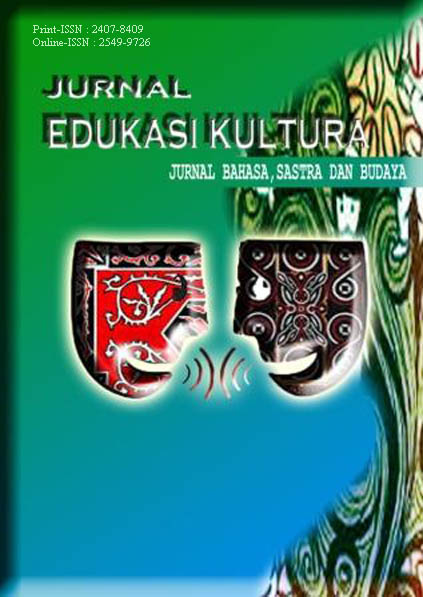Penilaian Auntentik Pada Kurikulum Merdeka Dalam Pembelajaran IPAS Di Sekolah Dasar
Abstract
This research aims to describe the implementation of authentic assessment in the Independent Learning Curriculum in Natural and Social Sciences (IPAS) learning in elementary schools. Authentic assessment is seen as a relevant evaluation approach because it assesses student learning processes and outcomes as a whole through contextual tasks such as projects, observations, and portfolios. The research method used is descriptive qualitative with data collection techniques through observation, interviews and documentation in several elementary schools. The research results show that authentic assessment has been implemented by science teachers, although there are still obstacles such as limited teacher understanding and implementation time. In general, authentic assessment encourages students to be more active, creative, and able to master subject matter in everyday life, thereby supporting the achievement of the Pancasila Student Profile in the Independent Curriculum.References
Achmad, G. H., Ratnasari, D., Amin, A., Yuliani, E., & Liandara, N. (2022). Penilaian autentik pada Kurikulum Merdeka Belajar dalam pembelajaran Pendidikan Agama Islam di Sekolah Dasar. Edukatif: Jurnal Ilmu Pendidikan, 4(4), 5685–5699. https://doi.org/10.31004/edukatif.v4i4.3280 academia.edu
Basyaib, F. (2021). Implementasi penilaian autentik dalam pembelajaran Bahasa Indonesia di Sekolah Dasar. Jurnal Pendidikan Dasar, 7(2), 145–153.
Cholifah, P., & Wahyu. (2021). Analisis kesiapan guru mengimplementasikan asesmen autentik dalam Kurikulum Merdeka Belajar. JPD: Jurnal Pendidikan Dasar, 7(2), 87–103.
Firdaus, H., Laensadi, A. M., Matvayodha, G., Siagian, F. N., & Hasanah, I. A. (2022). Analisis evaluasi program Kurikulum 2013 dan Kurikulum Merdeka. Jurnal Pendidikan dan Konseling (JPDK), 4(4), 686–692.
Fitri, N. Y., & Elpri, E. (2021). Analisis kesulitan guru dalam menerapkan penilaian autentik di Sekolah Dasar Negeri. Jurnal Kajian Penelitian dan Pendidikan dan Pembelajaran, 6(1), 1050–1059.
Gusti Nyoman Reniasih. (2020). Penerapan bimbingan berkelanjutan untuk meningkatkan kemampuan melaksanakan asesmen autentik pada guru di SD. Jurnal Ilmiah Sekolah Dasar, 4(1), 41–47.
Indriyani, N., Hanifah, R., & Fitria, Y. (2023). Penilaian autentik pada Kurikulum Merdeka Belajar dalam pembelajaran Ilmu Pengetahuan Alam (IPA) di Sekolah Dasar. Pendas: Jurnal Ilmiah Pendidikan Dasar, 8(1), 28–48.
Pebriyanti, M., Siagian, F. N., & Tabroni. (2024). Kesiapan guru dalam penilaian autentik pada Kurikulum Merdeka pembelajaran IPAS di Sekolah Dasar. Ibtida’: Jurnal Pendidikan Matematika, 5(1), 1–10. https://doi.org/10.37850/ibtida’.v5i1.677
Pratiwi, M. M., Arafat, Y., & Murjainah, M. (2023). Analisis kesiapan guru dalam melaksanakan pembelajaran Kurikulum Merdeka Belajar di SD Negeri 122 Palembang. Journal on Education, 6(1), 7951–7796.
Salis, I., V. Gultom, V., D. Naibaho, H., L. Osvaldo, F., A. Siregar, V., and N. Manjani. 2024. “Analisis Efektivitas Asesmen Otentik Berbasis HOTS Guna Meningkatkan Literasi Sains IPAS SD.” Progressive of Cognitive and Ability 3(2):107–18.
Sani, R. A. (2022). Penilaian autentik. Jakarta: Bumi Aksara.
Sirinding, A., Kania, D., Muzaqih, M. F., Ahmad, N. A., & Khoiriyah, S. N. (2023). Analisis kesulitan guru dalam penerapan penilaian autentik pada Kurikulum Merdeka di Sekolah Dasar. Cendikia: Jurnal Pendidikan dan Pengajaran, 1(3), 160–167. https://doi.org/10.572349/cendikia.v1i3.392 jurnal.kolibi.org
Published
How to Cite
Issue
Section
License
Copyright (c) 2025 Eka Putri Shakila, Silmy Novianty, Nazhila Eidewis Hudinta, Tresia Pebrianti Banurea, Nurul Khovifa, Nurhudayah Manjani

This work is licensed under a Creative Commons Attribution 4.0 International License.

This work is licensed under a Creative Commons Attribution 4.0 International License
Authors who publish with this journal agree to the following terms:
- Authors retain copyright and grant the journal right of first publication with the work simultaneously licensed under Creative Commons Attribution 4.0 International License that allows others to share the work with an acknowledgement of the work's authorship and initial publication in this journal.
- Authors are able to enter into separate, additional contractual arrangements for the non-exclusive distribution of the journal's published version of the work (e.g., post it to an institutional repository or publish it in a book), with an acknowledgement of its initial publication in this journal.Penulis.
- Authors are permitted and encouraged to post their work online (e.g., in institutional repositories or on their website) prior to and during the submission process, as it can lead to productive exchanges, as well as earlier and greater citation of published work (Refer to The Effect of Open Access).



